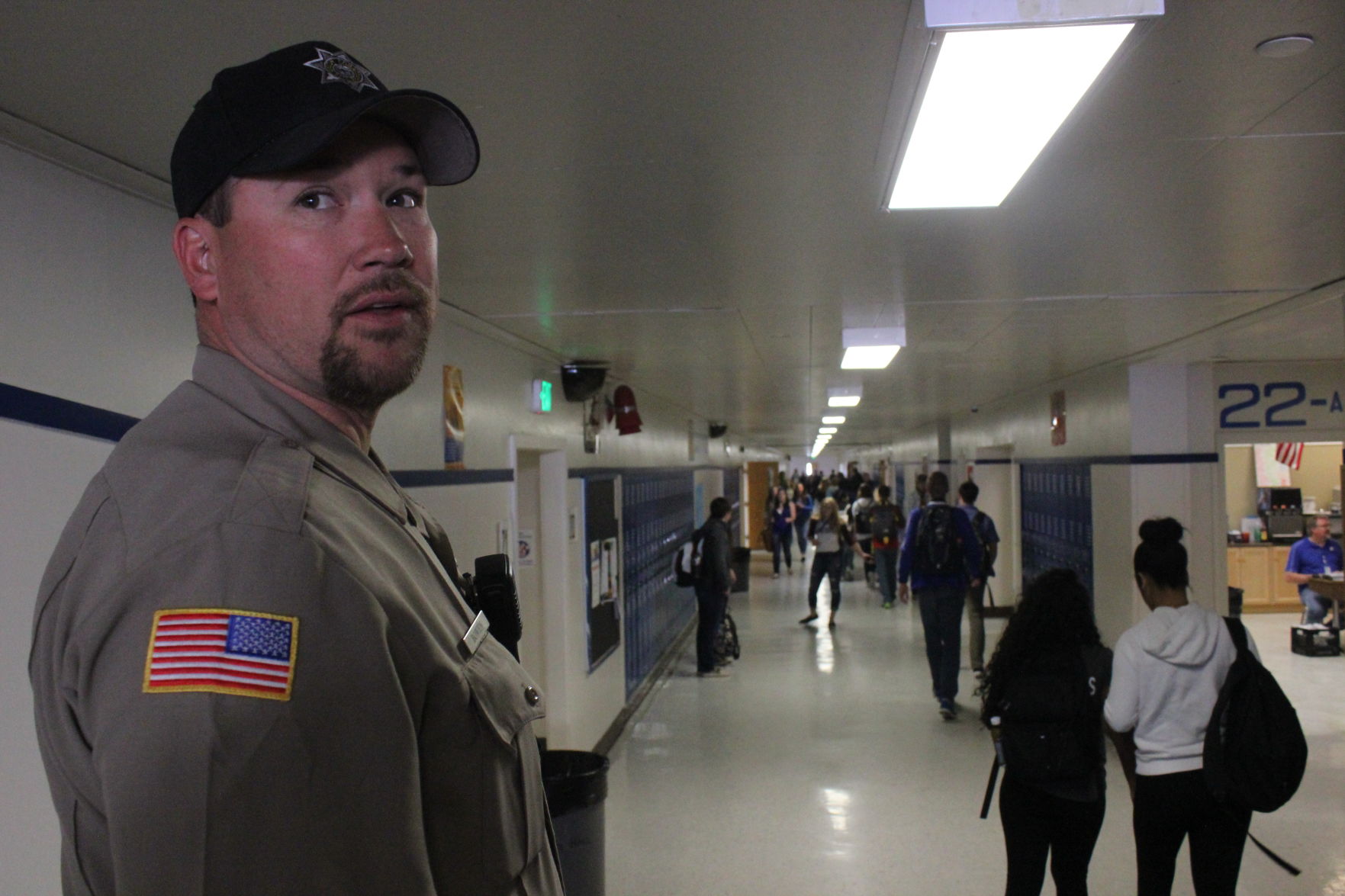Motivational speaker touches lives with his presentations on driving safely
Published 2:42 pm Friday, September 18, 2009

- walking the line: With traffic safety consultant and motivational speaker Syd Muzzy providing a helping hand, Jaden Brown receives a lesson in inebriation as he tries to walk a straight line while wearing special goggles that simulate the physical coordination of an advanced state of drunkeness by distorting vision and sense of balance. The Observer/CHRIS BAXTER
Numbers speak to Syd Muzzy.
Trending
“I’m gifted at mathematics. Going through a math book for me is like
reading a novel. I understand it (math) like a language,” said Muzzy,
a Vancouver, Wash., resident.
Trending
Still, numbers are not his passion. Teaching people how to avoid
highway accidents is. Muzzy gave a presentation about traffic safety
Wednesday at La Grande High School – a talk that gave his audience
reasons to laugh and cry.
And numbers to remember.
Muzzy pointed out that since the United States began Operation Iraqi Freedom in 2002 close to 4,400 American troops have been killed in Iraq. In the same period, 274,000 people have died in motor vehicle accidents in the United States.
Muzzy blames many traffic fatalities on motorists’ willingness to take chances while driving – drinking alcohol, talking on cell phones or unbuckling seat belts in moving vehicles to pick up items.
“Why do we do it?” Muzzy asked.
He then began pulling up his shirt to reveal a blue Superman T-shirt – the kind mild mannered Clark Kent dons in phone booths. The implication was clear. Many people see themselves as infallible.
“We go around thinking we are too fast, too strong, too quick. (Getting in a car accident) is not going to happen to me,’ ” Muzzy said.
He stresses that people need to do more than be taught to drive. They need to be taught to drive safely.
Muzzy points out that even monkeys can be taught to drive. Proof can be found at shows where monkeys are seen driving small motorized vehicles. They can drive, but not safely.
“People look and say, ‘Even a monkey can drive.’ But I challenge you to step in front of a monkey (who is driving) and see if it stops.”
Muzzy does not see a correlation between experience and driving skill.
“Experience doesn’t give you wisdom, it gives you habits,” the motivational speaker said.
Habits he feverishly tries to correct.
Muzzy cites people who drive on cruise control as an example. Many people place their hands on the bottom of the steering wheel and slouch back in their seat when on cruise control, a major mistake since drivers can not react quickly to a traffic hazard when in this position.
“It may take you two seconds to respond. By then it will be too late since you will have already traveled 200 feet (if driving 65 mph),” Muzzy said.
Whether or not you are driving in cruise control, it is always best to sit up and drive with your hands on top of the steering wheel to be in the best position to respond quickly, Muzzy said.
He also urges drivers to be aware of how much distance they are before doing taking their eyes off the road to do something like adjust their mirror.
“Always look further up the road first,” he said, noting that one traveling 60 mph is moving 88 feet a second.
Muzzy also urges drivers to have as few distractions as possible, which of course means no cell phone use.
He used a deck of cards Wednesday to demonstrate the perils of cell phones.
Muzzy selected a man from the audience and had him separate the deck’s cards by suits. The man, handling the cards easily, did this in 36 seconds. Next, Muzzy had him do the same thing while talking to him, asking him questions about his family and what 17 multiplied by 3 equals.
The man needed 49 seconds to separate the deck’s cards into suits.
“The brain slows down in conversation, then why are we talking on cell phones?” Muzzy said.
Alcohol, of course, also greatly impairs one’s ability to drive. Muzzy said that many people caught driving intoxicated have a blood alcohol content twice the legal limit. Anyone in this condition who hopes to pass a field sobriety test is sadly mistaken. To make his point Muzzy had people put on a set of goggles with multiple lenses. The goggles simulate what one sees when their blood alcohol is .16, twice the legal limit in most states.
Nobody donning the goggles at LHS Wednesday could even put one foot in front of the other in a straight line, so distorted was their vision.
Muzzy’s presentation was one of many he gave in Union County Wednesday and Thursday. His other talks were to students. Muzzy connects with students. He worked as a high school teacher and coach for 34 years in Washington.
Muzzy’s students during this time included his son, a promising teenager interested in following his footsteps and becoming an educator. Tragically, he died in a 1988 traffic accident 10 days before his high school graduation. Muzzy’s son was a passenger in a car that rolled. He was thrown from the vehicle because he had just taken off his seat belt to pick a book off the floor.
The tragedy left the teenager’s father devastated.
“They say I taught a driver’s ed class that summer but I don’t remember that summer,” Muzzy said. “If you you were in my class that summer I don’t remember you.”
Muzzy does remember all of his other students. He also remembers the hard times he faced growing up. He struggled mightily in school because of a profound hearing loss he suffered as a child after contracting mumps, measles and chickenpox all within a 10-day period. He started school slowly as a result and did not graduate from high school until he was 21.
Muzzy said this was not all bad, since his age gave him a physical advantage over other students, allowing him to excel in high school sports and earn an athletic scholarship to Eastern Washington University.
Muzzy, who went on to become an award-winning educator, was considered a hopeless cause by many of his grade school teachers. That is until one teacher took an interest in him and discovered his hearing loss and the impact it was having on his ability to learn. The hearing loss was camouflaging a brilliant mind.
Today Muzzy tries to touch other lives in the same way the teacher he spoke of did.
He tells a story of a man who was visiting beaches trying to save starfish by tossing those that washed ashore back into the ocean. Someone told the man:
“There are millions of starfish (on beaches). You can’t make a difference.”
The man then picked up a starfish and tossed it back into the ocean.
“I just made a difference for that one,” the man replied.
Muzzy’s Wednesday night talk and those he gave in Union County were sponsored by the Drug Free Relay. The 12th annual Drug Free Relay will be conducted Sept. 26 at La Grande High School’s track.









